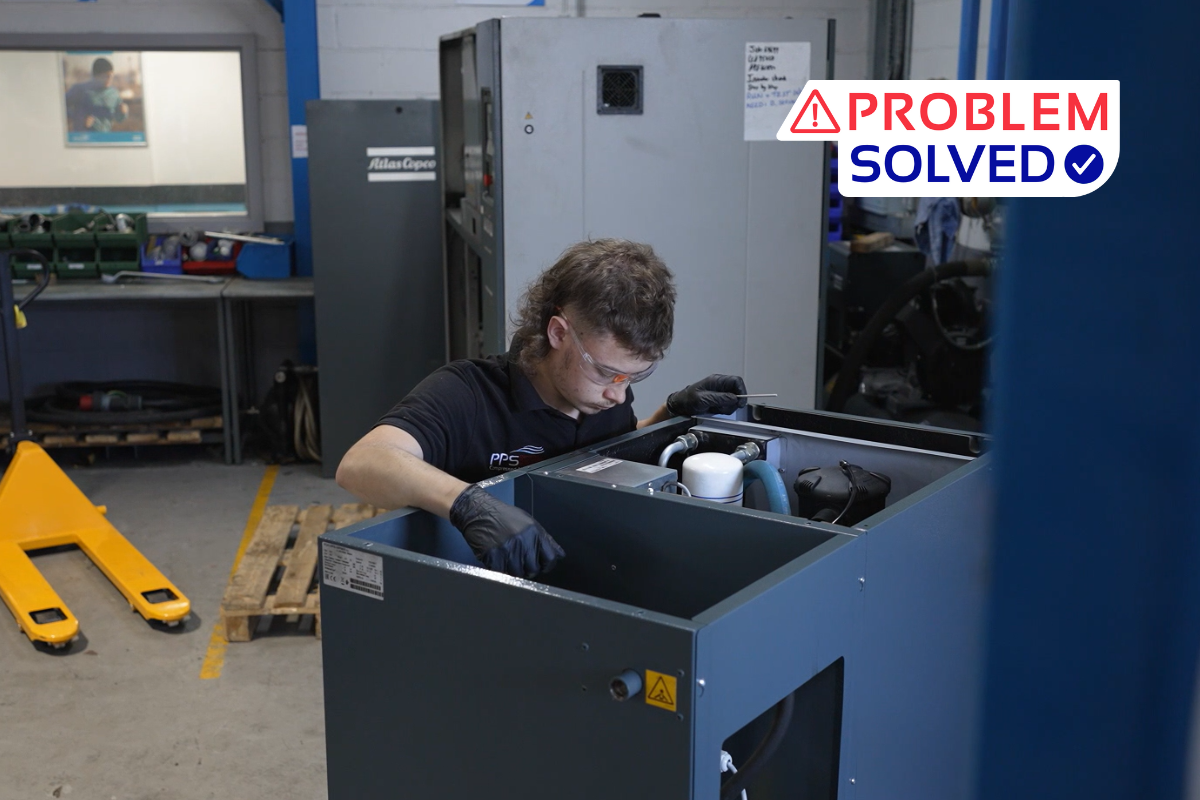Regardless of your industry or the size of your business, downtime is costly. If your production relies on an air compressor, you need to prevent air compressor downtime and keep things running smoothly.
At PPS we hear this phrase (or similar wording) at every site we visit:  These are the ways we prevent air compressor downtime, solving this problem for customers on a daily basis.
These are the ways we prevent air compressor downtime, solving this problem for customers on a daily basis.

Solved: Regular air compressor servicing prevents downtime
Regular air compressor servicing helps to avoid undue stress being placed on your system. Servicing helps to catch early signs of wear, so things like belts, bearings and seals can be replaced before they break. It also ensures oil hasn’t lost its lubrication properties, filters aren’t dirty and restricting airflow, and that drains aren’t blocked causing water buildup. Overheating is another cause of shutdown that can be avoided by regular cleaning of coolers, fans, and ventilation.
Using an air compressor maintenance checklist can help you keep on top of this, as well as having the right maintenance strategy in place for your site. For the majority of sites it will be a combination of the four key maintenance strategy approaches - preventive, corrective, predictive, and condition-based maintenance—each playing a vital role in avoiding costly disruptions.
Example:
Cirteq have worked with PPS for over 40 years to ensure they follow the correct service strategy for their site.
“PPS are a great team to work with. I have peace of mind and working with them takes something off my plate. They leave me knowing it’s left in good hands and that I know I don’t have to worry about the compressors or the plant room. Without the compressors we wouldn’t run, so working with a company that gives me no headaches is all you want.”
Bob Holinski, Facilities & Engineering Manager, Cirteq Ltd

Solved: doing regular leak detection surveys prevents downtime
Most compressed air systems have air leaks. They commonly occur on loose or poorly fitted couplings and joints, cracked seals and holes in pipes and hoses. The problem is, undetected air leaks put extra strain on your compressed air system and can increase your risk of downtime.
Regular compressed air leak detection surveys can help to prevent downtime in two key ways:
1. They help to maintain a stable system pressure
Undetected air leaks force the compressor to work harder to maintain required pressure. This extra strain increases wear and raises the risk of breakdowns. Regular surveys ensure leaks are identified and repaired early, keeping pressure stable and equipment running within design limits.
2. They prevent overloading the compressor
A compressor running constantly to compensate for leaks is more likely to overheat, suffer component fatigue, or trigger automatic shutdowns. Leak surveys reduce this workload, helping to maintain reliable operation.
The best way to test for air leaks?
There are a few ways to identify air leaks. Leaks can sometimes be identified by the sound generated, but in a noisy environment or where the leak occurs intermittently and in an inaccessible part of the system, they can be missed.
We always recommend the use of an ultrasonic leak detector for a leak detection survey, this gives a much more accurate report of the true cost of leakage on site.
Example:
A carpet manufacturer in the North of England contacted PPS when they were looking for ways to reduce their energy consumption. They had been looking at separate sections of the business to find out where the heavy energy users were. Their compressed air generation and pipework needed some attention.
The customer knew they had leaks, they could hear them, so this became the initial focus. PPS carried out the leak detection survey using an ultrasonic leak detector. There were a total of 40 leaks on the system, the biggest one was registering at 89dB. A leak of that size wastes a substantial amount of energy but can also become a health and safety problem, due to the noise level, if situated near workers.
PPS Engineers were on site for two days fixing the leaks. This textile industry customer spent £3,020.58 to save £36,784.88 (estimate based on £0.12/kWh) on their compressed air energy bill and reduce their carbon footprint. The compressed air they generate is no longer feeding leaks, instead being used for its intended purpose of weaving carpets.

Solved: Installing a duty/standby system prevents downtime
Compressed air is a vital part of many production processes. The potential cost of short-term disruption due to service downtime, parts availability or equipment failure should be considered. The associated costs of outages in terms of labour costs, production disruption and delays, often outweigh the cost of any standby equipment.
A duty/standby system gives you:
- Instant backup - if the main (duty) compressor fails unexpectedly, the standby compressor can be brought online immediately. This keeps production running and avoids costly downtime.
- Seamless maintenance - regular servicing can be carried out on the duty compressor without disrupting operations because the standby unit can handle the load during maintenance windows.
- Load sharing for extended life - in some setups, the system can be configured to alternate between the two compressors, reducing wear and extending the life of both units - lowering the risk of failure over time.
- Increased system reliability - a single point of failure is removed. With redundancy built in, there’s less risk of unplanned downtime stopping production entirely.
- Operational flexibility - a duty/standby setup offers flexibility during periods of variable air demand. This allows you to match compressor use to production needs while maintaining resilience.
Example:
An East Yorkshire grain milling business was experiencing multiple issues with their aging and unreliable compressed air system. A site survey by PPS found that two of the milling units were powered by four fixed speed compressors. The PPS team advised that they could replace all four fixed speed compressors with one variable speed drive machine to run both milling units.
Following an energy audit to accurately assess demand, the PPS team installed a full duty/standby system in their new compressor house, along with a compressed air link line to both mill units.
The customer has reduced the risk of downtime as they now have an instant back up. They also had a centralised controller installed, this increases the reliability of the system by distributing the load equally between the duty and standby compressor, equalising the wear. Both compressors can be maintained on a single visit from a service engineer and without any downtime.

Solved: upgrading old, unreliable compressors prevents downtime
Ageing compressors are a big risk factor for unplanned downtime. This is because:
- They are more prone to wear, overheating, oil contamination and mechanical failures
- Worn-out compressors often struggle to maintain consistent pressure
- Spare parts can be difficult to source, delaying repairs and prolonging downtime
The capital outlay for a new compressor may seem daunting. But when you consider the true cost of unplanned downtime and think about it over the lifetime of the product, it becomes a logical decision.
Over the lifetime of a compressor, the initial purchase price works out at approximately 10% of the cost. Meanwhile, up to 80% of your outlay over the lifetime of the machine is likely to be on energy costs, leaving the other 10% to maintenance.
Example:
We recently worked with a cake manufacturer who was struggling with two ageing fixed speed compressors. The compressors had become prone to breakdowns and parts were becoming increasingly expensive and difficult to source.
Their system upgrade included a full energy audit to correctly assess the site demand. PPS then installed a full duty/standby compressed air system with an optimised compressor room. Air receivers can be easily bypassed for annual insurance inspections and in-line filters can be isolated for routine services – without affecting 24/7 production in the plant.
The new air compressor gives the site reliability and peace of mind.

Solved: using air compressor hire in an emergency situation prevents downtime
Your air compressor has gone down and production has halted. Sometimes the only solution is air compressor hire.
In most cases, emergency hire is for sites that have suffered a failure. This might be the only compressor on site, or it might be one of several. Either way, you don’t want to risk costly downtime.
The various reasons for needing emergency hire include:
- Your air compressor breaks down and there’s no back-up machine on site
- Your air compressor breaks down and your back-up machine doesn’t have enough capacity
- Your air compressor breaks down and you have a back-up machine but want a hire machine just in case the back-up machine fails
- You have several air compressors and one fails, leaving you short of capacity
- You take on additional work with a fast turnaround and find your current air compressor(s) can’t generate enough air
In some cases, a company might hire an additional air compressor as a back-up machine, which subsequently doesn’t get used. However, it’s best to have the peace of mind that the machine is there, ready for immediate use, if any other machines fail on site.
Example:
Following a major failure on their duty air compressor, Abel Systems used one of our hire air compressors to get production back up to full capacity and avoid unnecessary downtime while they waited for their new compressed air system to be installed.
“From start to finish PPS recognised the importance of maintaining production at 100%. The prompt supply of a hire machine helped us to do this whilst we waited for our new machine to be installed.”
Andy Hawksworth, General Manager, Abel Systems Ltd
In summary, preventing downtime is all about having the right systems, support, and proactive maintenance in place. From regular servicing and leak detection to upgrading ageing equipment, installing duty/standby systems or using emergency hire, there are proven ways to reduce the risk of costly interruptions to your production. At PPS, we work with customers every day to put these solutions in place, helping them keep their compressors, and their businesses, running reliably.

